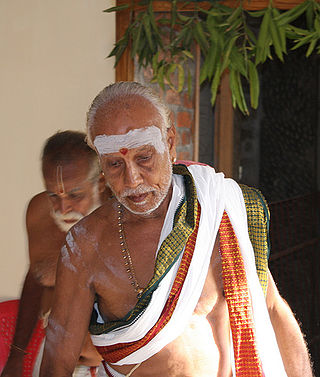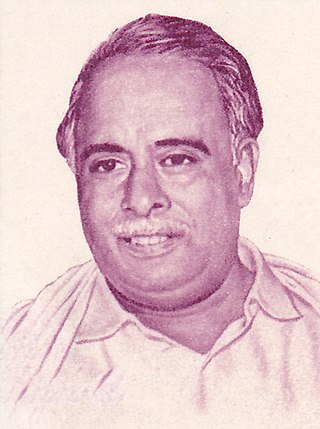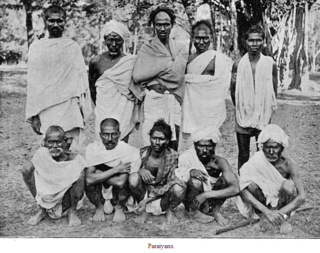Related Research Articles

Iyers are an ethnoreligious community of Tamil-speaking Hindu Brahmins. Most Iyers are followers of the Advaita philosophy propounded by Adi Shankara and adhere to the Smarta tradition. This is in contrast to the Iyengar community, who are adherents of Sri Vaishnavism. The Iyers and the Iyengars are together referred to as Tamil Brahmins. The majority of Iyers reside in Tamil Nadu, India.

Thiruvalluvar, commonly known as Valluvar, was an Indian poet and philosopher. He is best known as the author of the Tirukkuṟaḷ, a collection of couplets on ethics, political and economic matters, and love. The text is considered an exceptional and widely cherished work of Tamil literature.

The Neo Buddhist movement is a religious as well as a socio-political movement among Dalits in India which was started by B. R. Ambedkar. It re-interpreted Buddhism and created a new school of Buddhism called Navayana. The movement has sought to be a socially and politically engaged form of Buddhism.

Dalit, also some of them previously known as untouchables, is the lowest stratum of the castes in the Indian subcontinent. Dalits were excluded from the four-fold varna of the caste hierarchy and were seen as forming a fifth varna, also known by the name of Panchama. Several scholars have drawn parallels between Dalits and the Burakumin of Japan, the Baekjeong of Korea, the Hukou system of China and the peasant class of the medieval European Feudal system.

Conjeevaram Natarajan Annadurai, popularly known as Anna, also known as Perarignar Anna, was an Indian politician who served as the fourth and last Chief Minister of Madras State from 1967 until 1969 and first Chief Minister of Tamil Nadu for 20 days before his death. He was the first member of a Dravidian party to hold either post.

Paraiyar, or Parayar or Maraiyar, is a caste group found in the Indian states of Tamil Nadu and Kerala and in Sri Lanka.

Viduthalai Chiruthaigal Katchi formerly known as the Dalit Panthers of India or the Dalit Panthers Iyyakkam is an Indian social movement and political party that seeks to combat caste based discrimination, active in the state of Tamil Nadu. The party also has a strong emphasis on Tamil nationalism. Its chairman is Thol. Thirumavalavan, a lawyer from Chennai and its general secretary is the writer Ravikumar.

Tamil-Brahmi, also known as Tamili or Damili, was a variant of the Brahmi script in southern India. It was used to write inscriptions in the early form of Old Tamil. The Tamil-Brahmi script has been paleographically and stratigraphically dated between the third century BCE and the first century CE, and it constitutes the earliest known writing system evidenced in many parts of Tamil Nadu, Kerala, Andhra Pradesh and Sri Lanka. Tamil Brahmi inscriptions have been found on cave entrances, stone beds, potsherds, jar burials, coins, seals, and rings.
Dravidian parties include an array of regional political parties in the state of Tamil Nadu, India, which trace their origins and ideologies either directly or indirectly to the Justice Party and the Dravidian movement of C. Natesanar and Periyar E. V. Ramasamy. The Dravidian movement was based on the linguistic divide in India, where most of the Northern Indian, Eastern Indian and Western Indian languages are classified as Indo-Aryan, whereas the South Indian languages are classified as Dravidian. Dravidian politics has developed by associating itself to the Dravidian community. The original goal of Dravidian politics was to achieve social equality, but it later championed the cause of ending the domination of North India over the politics and economy of the South Indian province known as Madras Presidency.

Erode Venkatappa Ramasamy, revered by his followers as Periyar or Thanthai Periyar, was an Indian social activist and politician who started the Self-Respect Movement and Dravidar Kazhagam. He is known as the 'Father of the Dravidian movement'. He rebelled against Brahmin dominance and gender and caste inequality in Tamil Nadu. Since 2021, the Indian state of Tamil Nadu celebrates his birth anniversary as 'Social Justice Day'.
Madabhushi Rangadorai, better known by his pen name Randor Guy, was an Indian lawyer, columnist and film and legal historian associated with the English language newspaper The Hindu. He was also the official editor of the weekly column "Blast from the Past" that appeared in The Hindufor many years; in this series Randor Guy wrote about not so well known details about the Tamil movies and the personalities, produced since mid 1930s to late 1960s.
C. Iyothee Thass was an Indian anti-caste activist and a practitioner of Siddha medicine. He famously converted to Buddhism and called upon the Paraiyars to do the same, arguing that this was their original religion. He also founded the Panchamar Mahajana Sabha in 1891 along with Rettamalai Srinivasan. Panchamas are the ones who are outcastes.
Diwan Bahadur Rettamalai Srinivasan, commonly known as R. Srinivasan, was a Scheduled Caste activist and politician from then Madras Presidency of British India. He is a Paraiyar icon and was a close associate of Mahatma Gandhi and was also an associate of B. R. Ambedkar. He is remembered today as one of the pioneers of the Scheduled caste movement in India. He founded the Adi dravida mahajana sabha in 1893.
Dalit literature is a genre of Indian writing that focuses on the lives, experiences, and struggles of the Dalit community, who have faced caste-based oppression and discrimination for centuries. This literature encompasses various Indian languages such as Marathi, Bangla, Hindi, Kannada, Punjabi, Sindhi, Odia and Tamil and includes diverse narratives like poems, short stories, and autobiographies. The movement originated in response to the caste-based social injustices in mid-twentieth-century independent India and has since spread across various Indian languages, critiquing caste practices and experimenting with different literary forms.
Azhagiya Periyavan is the pen name of C.Aravindan, a modern Tamil writer and journalist. He writes about Dalit issues.

Sirpi Balasubramaniam is a Tamil poet, critic, scholar and professor from Tamil Nadu, India.
The Self-Respect Movement is a popular human rights movement originating in South India aimed at achieving social equality for those oppressed by the Indian caste system, advocating for lower castes to develop self-respect. It was founded in 1925 by S. Ramanathan who invited E. V. Ramasamy to head the movement in Tamil Nadu, India against Brahminism. The movement was extremely influential not just in Tamil Nadu, but also overseas in countries with large Tamil populations, such as Sri Lanka, Burma, Malaysia and Singapore. Among Singapore Indians, groups like the Tamil Reform Association, and leaders such as Thamizhavel G. Sarangapani were prominent in promoting the principles of the Self-Respect Movement among the local Tamil population through schools and publications.
The Swadeshi Steam Navigation Company (SSNC) was one of the first indigenous Indian shipping companies set up during the Indian independence movement. It was started in 1906 by V. O. Chidambaram Pillai to compete against the monopoly of the British India Steam Navigation Company (BISNC). It sailed ships between Tuticorin and Colombo until it was liquidated in 1911.
Dalit studies is a new field of research in India which looks at the problem of marginalised groups, namely Dalits, tribals, religious minorities, women from excluded groups, denotified tribes, physically challenged and similar groups in economic, social and political spheres. Dalit studies scholars also undertake research on the nature and forms of discrimination and social exclusion faced by marginalised groups.

V. Geetha is an Indian feminist activist who writes on issues related to caste, gender, education and civil rights. She operates from Madras and has carried out research on the nature and proliferation of NGOs operating in Tamil Nadu. She has set up the federation of women's groups in the state and is also the editorial director at Tara Books. Other than this, she has translated two of Perumal Murugan's novels into English. Based on her research, she has observed that "Violence as an experience seemed to me to represent a point of intersection of trajectories of hurt, touch, love, fear, hunger and shame. It seemed to inhere as much in the grime of every day life, in habitual tone, gesture and touch, as it did in the particular and determined act of violence."
References
- ↑ Nalini Rajan (6 March 2007). 21st Century Journalism in India. SAGE Publications. pp. 68–71. ISBN 978-0-7619-3561-2.
- ↑ "Ayothidhasar and his Oru Paisa Tamilan". The Hindu . 23 May 2010. Archived from the original on 28 May 2010. Retrieved 17 April 2014.
- ↑ Nalini Rajan (6 March 2007). 21st Century Journalism in India. SAGE Publications. p. 68. ISBN 978-0-7619-3561-2.
- ↑ "Remembering Dalit Murasu, a voice of Dalits, by Dalits, for Dalits". The New Indian Express. 13 April 2013. Retrieved 17 April 2014.
- ↑ "Remembering the precursor of Dravidian movement". The Hindu. 20 May 2012. Retrieved 22 June 2014.